I went from eating 3,000 calories a day to 800 with the Fasting Mimicking Diet. I lost 9lbs in 5 days. But I plan to gain it all back within a couple of weeks. I didn’t do this for weight loss but overall health and longevity. What is the Fasting Mimicking Diet? Is its extreme caloric restriction healthy? And how has reviewing the scientific literature flipped my thoughts on doing it again? Well, let’s get into it!
5-Day Fasting Mimicking Diet
The Fasting Mimicking Diet is a form of caloric restriction. It’s a diet designed to mimic fasting without fasting. Typically, participants consume 10-40% of their daily calories for five consecutive days. Around 1,000 calories the first day, and 800 calories the remaining days. I typically consume 3,000 calories so this is a mere 27% of my typical consumption. But those calories are nutrient dense to prevent malnutrition. It is commercially available through Prolon as a low‐sugar, low‐protein diet that contains high levels of unsaturated fat and micronutrients. [1]
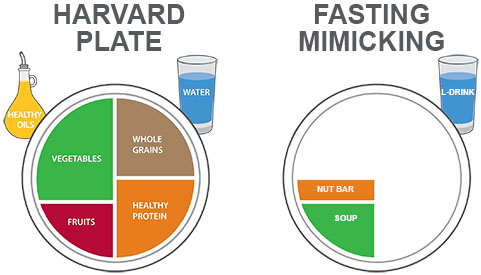
My dad bought me two 5-day FMD packages from Prolon last Christmas. I did one FMD in March and the second one last week. I’ve had two rounds of this diet. Neither were enjoyable. Constant hunger was rarely forgotten, and my favorite foods were sorely missed. At the end of each one, I thought I’d never do it again. That was until I read the latest review titled, “The ups and downs of caloric restriction and fasting.” It reminded me why I did it in the first place.
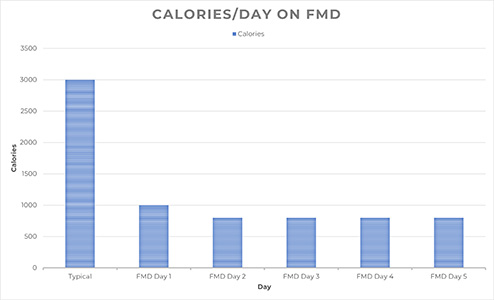
How it Works
Reduced caloric intake without malnutrition has been repeatedly shown to elicit systemic health benefits. Interestingly, virtually all religions incorporate some form of it. Although I knew this before, I’d forgotten the breadth and depth of these benefits. They start after 12-36 hours of caloric restriction. Metabolically, the body switches from using glucose for energy (a form of carbohydrate), to fat and ketone bodies. This results in a decrease of body fat.
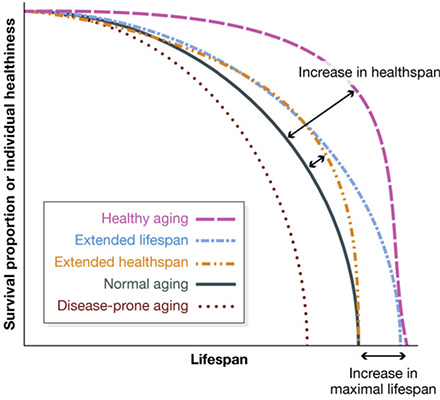
Cellularly, mechanisms to cope with this caloric restriction are boosted. Damaged DNA gets repaired so cells can function properly. Instead of that DNA turning cancerous, it can go back to helping you live healthfully. Autophagy gets boosted too. Some of those cells that couldn’t be repaired get recycled for their parts or thrown into the trash. Cells often live longer, damage less, and get repaired more often. This extends human lifespan when applied correctly. These reasons are what interest me most. I’m not sure you can get the magnitude of cellular benefits without some type of caloric restriction. That’s why I’ll do this diet again.
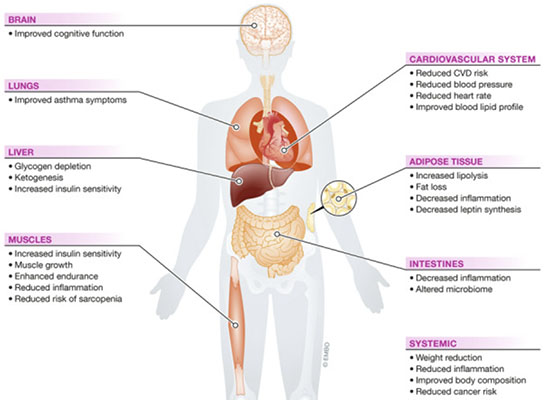
Not only can it help humans live longer, but live healthier too. It may lower the risk of cardiovascular disease, our number one killer. It’s been associated with improved immune function decreasing symptoms of asthma, multiple sclerosis, and arthritis. And studies are showing benefits of using caloric restriction during cancer treatment to target cancerous cells without harming noncancerous ones. The more studies I read, the more convinced I’ve become that some form of temporary caloric restriction has vital benefits. Benefits I don’t want to miss even if the process sucks.
My Experience
It’s funny, when I told people about the diet I was doing, I got the same reaction from everyone. “That can’t be healthy.” But identifying those reasons has been difficult. Does this 5-day caloric restriction result in muscle loss? A study this year on healthy young adults showed no loss in muscle mass, strength, and torque [2]. Despite the evidence, I made sure to exercise lightly during the fast. A few 20min easy rowing sessions along with bodyweight squats, pushups, and pullups to preserve muscle tissue. So, I don’t think this is a worry.
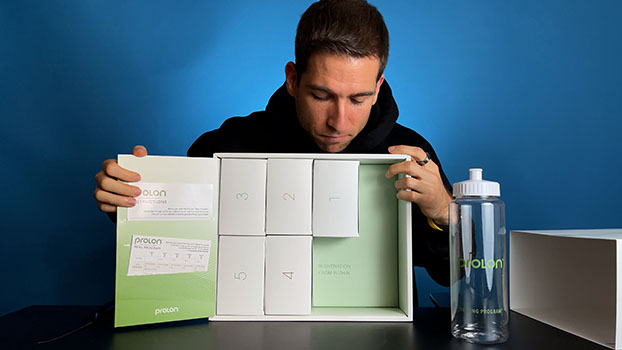
Prolon Kit for 5-Day Fasting Mimicking Diet
Does this caloric restriction lead to a rebound weight affect? Unfortunately, there’s not much data on this. Studies haven’t followed up on it consistently. During the CALERIE trial, the participants did not develop eating disorders or tendencies toward binge eating though. Severe and malnourished caloric restriction has been shown to cause stress, depression, and declining mental health. But controlled caloric restriction with adequate nutrients, like with the FMD, is not generally reported to have negative outcomes. If anything, they’re positive. After both fasts, I did eat more immediately after. But I quickly shifted to my typical healthy diet and haven’t seen full weight regain. While this may be an issue for some, I haven’t experienced it.
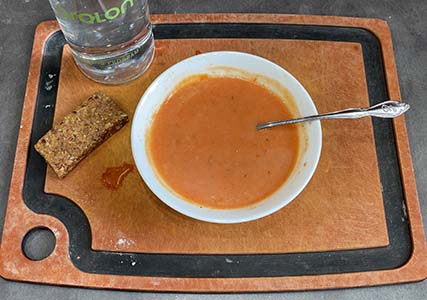
FMD Day 5: Lunch 
FMD Day 5: Dinner
Does this caloric restriction lead to unhealthy views of food? I never thought about this during my week in March. I was starving and just wanted to get back to my normal diet. But I became slightly worried during my second round of FMD. On day five, my hunger almost disappeared. I started to worry I wouldn’t be hungry again. What if my body got too used to this extreme restriction? Might I not want to ever eat again? As soon as I had my normal breakfast on day six, those worries evaporated. I remembered my love for healthy eating and reverted to my normal diet. It turns out, the experience of hunger is said to decrease with the length and repetition of caloric restriction. That’s what happened to me. Some studies have even shown that most participants experience an absence of hunger. This is common as the body adapts quickly. If anything, I think it’s helped me realize that temporary mild hunger is normal. I don’t always need to be full. I can wait for my next scheduled meal.
Final Thoughts
I was ready to give this diet 4/5 stars and never do it again. That was based upon my previous positive knowledge of the subject but discomfort of the fast. But reading the latest 2022 review flipped my thoughts. The benefits appear overwhelming. The review convinced me that I should be doing this every year or so. If I do it again next year, I’ll make the recipes myself since I think I can do it cheaper and healthier. I’ll share that with you when I do. Therefore, I’ve upgraded the Fasting Mimicking Diet to 4.5 stars out of 5. Since it’s only a temporary diet, and more research is welcomed.
For most people, this diet is beneficial. But I’m not sure you should do it. I think focusing on optimizing your regular breakfast, lunch, and dinner will yield much better results than a 5-day fast every few months. It’s so hard to change behaviors. I’d rather see people focus all their effort on the diet consumed most often than be excited about a shiny object. But if your diet is already dialed in, and you want to take the next nutritional step, the Fasting Mimicking Diet might be your answer. These are my latest habits for health excellence.

